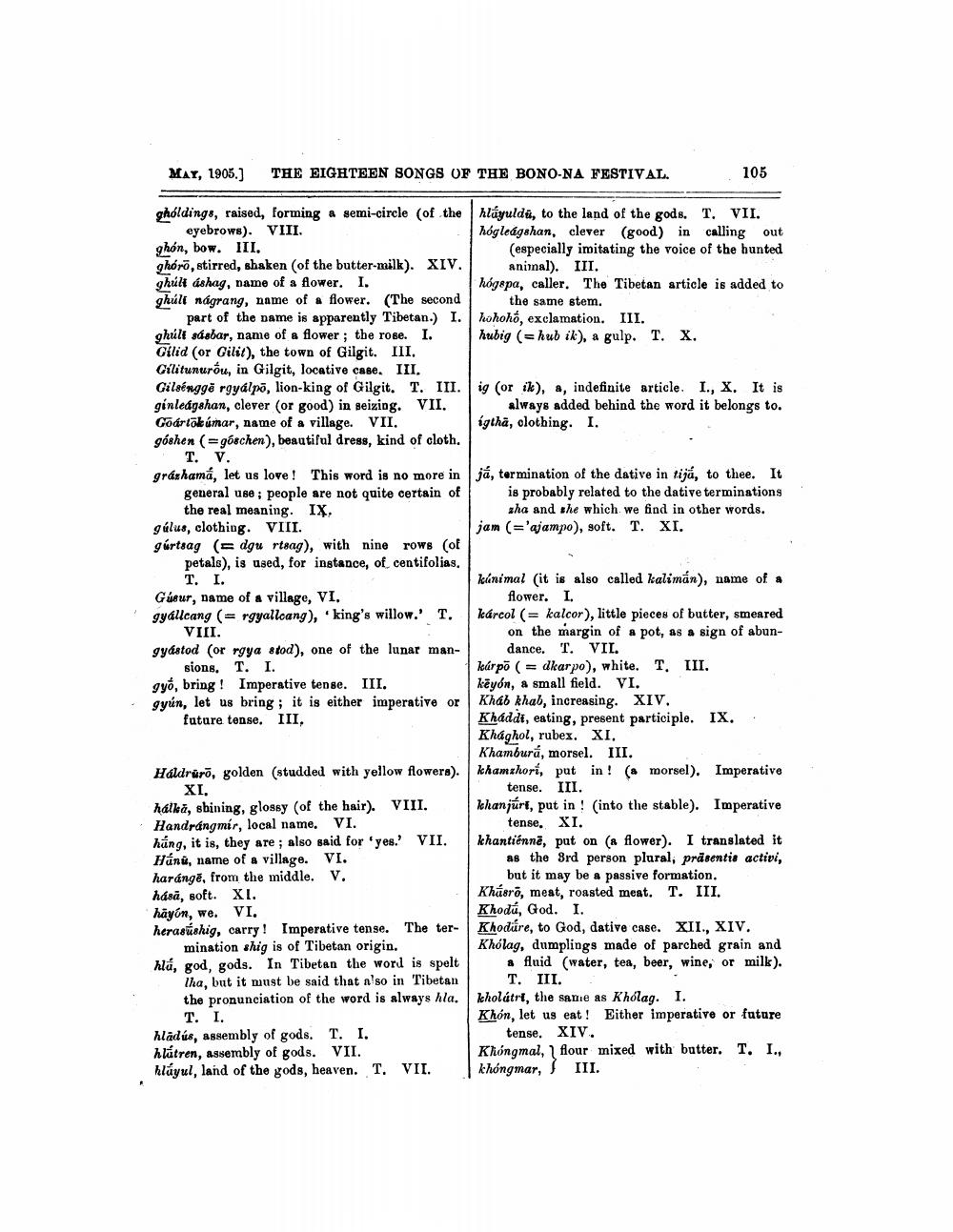________________
MAY, 1905.)
THE EIGHTEEN SONGS OF THE BONO-NA FESTIVAL.
105
gholdings, raised, forming a semi-circle of the hláyulda, to the land of the gods. T. VII. eyebrows). VIII.
hógleágshan, clever (good) in calling out ghón, bow. III.
(especially imitating the voice of the hunted ghóro, stirred, shaken (of the butter-milk). XIV. animal). III. ghult áshag, name of a flower. I.
hogspa, caller. The Tibetan article is added to ghúlt nágrang, name of a flower. (The second the same stem.
part of the name is apparently Tibetan.) I. hohohó, exclamation. III. ghult sásbar, name of a flower; the rose. I. I hubig (= hub ik), a gulp. T. X. Gilid (or Gilit), the town of Gilgit. III. Cílitunuróu, in Gilgit, locative case. III. Gilsénggé rgyalpo, lion-king of Gilgit. T. III. ig (or ik), a, indefinite article. I., X. It is ginleágshan, clever (or good) in seizing. VII. always added behind the word it belongs to. Coartökumar, name of a village. VII.
igtha, clothing. I. góshen (=göschen), beautiful dress, kind of cloth.
T. V. gräshamá, let us love! This word is no more in já, termination of the dative in tijá, to thee. It
general use : people are not quite certain of is probably related to the dative terminations the real meaning. IX.
aha and she which we find in other words. gúlus, clothing. VIII.
jam (='ajampo), soft. T. XI. gúrtsag (=dgu rtsag), with nine rows of
petals), is used, for instance, of centifolias, T. I.
kinimal (it is also called kalimán), name of a Gusur, name of a village, VI.
flower. I. gyállcang (= rgyallcang), king's willow.' T. kárcol (= kalcor), little pieces of butter, smeared VIII.
on the margin of a pot, as a sign of abungyástod (or rgya stod), one of the lunar man- dance. T. VIL. sions. T. I.
kárpö ( = dkarpo), white. T. III. gyó, bring! Imperative tense. III.
këyón, a small field. VI. gyún, let us bring; it is either imperative or Kháb khab, increasing. XIV. future tense. III,
Khaddi, eating, present participle. IX. . Khághol, rubex. XI.
Khamburá, morsel. III. Haldrurā, golden (studded with yellow flowers). khamxhorí, pat in! (a morsel). Imperative XI.
tense. III. halkā, shining, glossy (of the hair). VIII. khanjúrt, put in ! into the stable). Imperative Handrángmír, local name. VI.
tense. XI. háng, it is, they are ; also said for 'yes' VII. khantiénnē, pat on a flower). I translated it Hánu, name of a village. VI.
as the 3rd person plural, präsentis activi, harángë, from the middle. V.
but it may be a passive formation. hásā, soft. XI.
Khásrő, meat, roasted meat. T. III. hayon, we. VI.
Khodú, God. I. herasúshig, carry! Imperative tense. The ter- Khodáre, to God, dative case. XII., XIV. mination shig is of Tibetan origin.
Khólag, dumplings made of parched grain and hlá, god, gods. In Tibetan the word is spelt & fluid (water, tea, beer, wine, or milk).
tha, but it must be said that also in Tibetan T. III. - the pronunciation of the word is always hla. kholátri, the same as Khólag. I. T. I.
Khon, let us eat! Either imperative or future hlādús, assembly of gods. T. I.
tense. XIV. hlátren, assembly of gods. VII.
Khongmal, flour mixed with butter. T. I., hláyul, land of the gods, heaven. T. VII. khóngmar, III.




